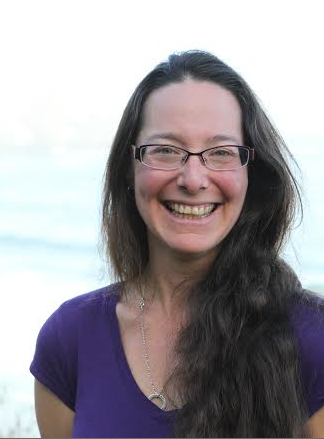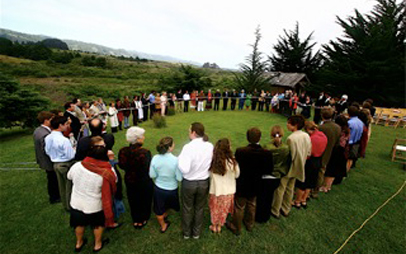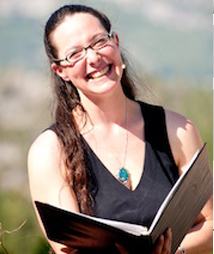Today SevenPonds speaks with Lissin Lev Chaya, a certified life-cycle celebrant. Currently based in Pacifica, California, she received her training and certification from the Celebrant Foundation and Institute. She has been performing rituals and ceremonies for over 20 years. Today, she talks with us about what inspired her to become a celebrant, her personal approach as a celebrant and some of the advantages of and challenges for celebrants planning memorial services.
Zoë: What inspired you to become a celebrant and what is your personal approach?
Lissin: I was inspired to become a celebrant when friends asked me to officiate their wedding. I found that the feeling of holding a space and creating a ceremony was something I really loved doing and felt a calling to. I felt like I was really good at it. It inspired me to take courses with the Celebrant Foundation and Institute. As for my personal approach, I believe ceremony creates opportunity for people to get together whether in times of joy or sorrow and hold space. When it comes to memorial services, it gives me an opportunity to honor a deceased person in a unique and authentic way.
Zoë: What are the advantages of having a celebrant plan memorial services? What is the average cost for this type of service?
Lissin: With a celebrant, you get a trained professional. If you choose a life-cycle celebrant, you are hiring someone you can really trust and who, while holding space, will really honor the deceased loved one. A celebrant will create a completely unique ceremony and support you in making a meaningful ceremony for your family and yourself. In the U.S., there is a pretty big range of what a celebrant charges. It ranges from $300 to $1000. Celebrants work with funeral homes and directors to help create a seamless event—for lack of a better word—so that the bereaved can trust that they’ll be taken care of in the process.
Zoë: Are there any challenges to planning memorial services after a death versus those planned ahead of time during terminal illness?
Lissin: They are two totally different things. It is not necessarily a challenge. Some people would never dream of planning a memorial service or celebration of life while others enjoy the opportunity of having the ability to make choices. Some people plan it so that they can attend a celebration of life when they’re still around rather than a memorial service. It adds so much to creating a personal, meaningful event. There are benefits of talking to the family members to get stories when the person dying is still alive or after they’re gone—those stories are still available.
Zoë: Do you have any stories, whether touching moments or difficulties, from past memorial services you’ve been involved with?
Lissin: I am always touched when loved ones get up to tell stories of the person who is gone. Some of the deepest magic lies there. I officiated my grandmother’s funeral. It was intense and touching on a deep level and very emotional. It was a huge honor to be able to offer that to my family. I loved a recent service I did for a gentleman who really appreciated nature on the California coast. Everyone was given handfuls of wildflower seeds to scatter in place for him. Music is also very important to me. It really can take the ceremony to a whole other level.
Lissin Lev Chaya’s 5 Tips for Planning a Personal and Authentic Memorial Ceremony
- For the bereaved, have an advocate.
- Choose an officiant you connect with.
- Decide on the tone of the ceremony.
- Decide on your location.
- If the beloved honoree is still alive, and it is still possible and feasible, find out their wishes for a memorial ceremony while they are still able to share them with you.
Lissin: Be prepared for all the emotions—the laughter, tears, joy and pain when stories are being told. It is important to take care of themselves. Hopefully they have an advocate who can speak for and help them with everything. They should also sleep enough, drink enough water and get enough rest. It truly can be an overwhelming process. Those emotions will still be there. A good ceremony will provide an opening, safe space to allow the grief, emotion and everything to come out. It will also carve out time and create the space for the community to support each other.
Zoë: Thanks so much for speaking with us!
Lissin: You’re welcome. Thank you so much!
More SevenPonds Interviews:

 How Can a Celebrant Assist Grieving Loved Ones with Planning Memorial Services? An Interview with Lissin Lev Chaya
How Can a Celebrant Assist Grieving Loved Ones with Planning Memorial Services? An Interview with Lissin Lev Chaya





 Having an Estate Plan Is Essential – So Is Discussing It With Your Children
Having an Estate Plan Is Essential – So Is Discussing It With Your Children

 “Summons” by Aurora Levins Morales
“Summons” by Aurora Levins Morales














